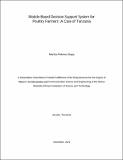| dc.description.abstract | In Tanzania, many poultry farms are considered to have ineffective poultry management practices
mainly due to the lack of adequate systems and procedures to assist poultry farmers in making
decisions. However, in a range of industries and agricultural sectors, including poultry farming,
information is widely recognized as a crucial component for good decision-making. Furthermore,
many researchers agree that using mobile decision-support systems to assist farmers in making better
decisions is an effective technique. The goal of this research was to create a mobile-based decision
support system that will assist small-scale poultry farmers in Tanzania in obtaining trustworthy poultry
farming information that would enable them to make informed decisions about their farming
operations. Decision Support Systems (DSS) are well-known in this context as interactive computer based systems that assist individuals in problem-solving and decision-making using information
technology, data, documents, and knowledge. This study outlines how a data-driven strategy was
utilized to construct a decision-support system for Tanzanian poultry farmers. The systematic
approach used in this study comprised of the following steps: The first step was to perform a
thorough literature analysis to identify and assess the information management needs of Tanzanian
small-scale poultry farmers. Poultry farmers commonly seek information about chicken health,
housing, egg production, chicken diets, and chicken breeds, among other things. Second, the
gathered data was processed and used to create user requirements for the decision support system.
Finally, after determining user needs, the implementation of the mobile-based decision support
system began. Using Android Studio and RASA, an open-source machine learning framework for
developing chat and voice context assistants, a conversational, mobile-based decision support
application that offers information to farmers based on their needs through a text-based chat
conversation was developed. The study findings identified that majority of the small-scale poultry
lack reliable sources to obtain poultry management information like poultry diseases, poultry
feeds, housing, and breed types. Furthermore, after conducting a user acceptance test, the study
findings indicated that the developed system will be very helpful to the small-scale poultry
farmers, and therefore it was recommended that the extension officers and small-scale poultry
farmers should be made aware of the developed mobile-based decision support system (KaPU)
for productive poultry management practices. | en_US |

